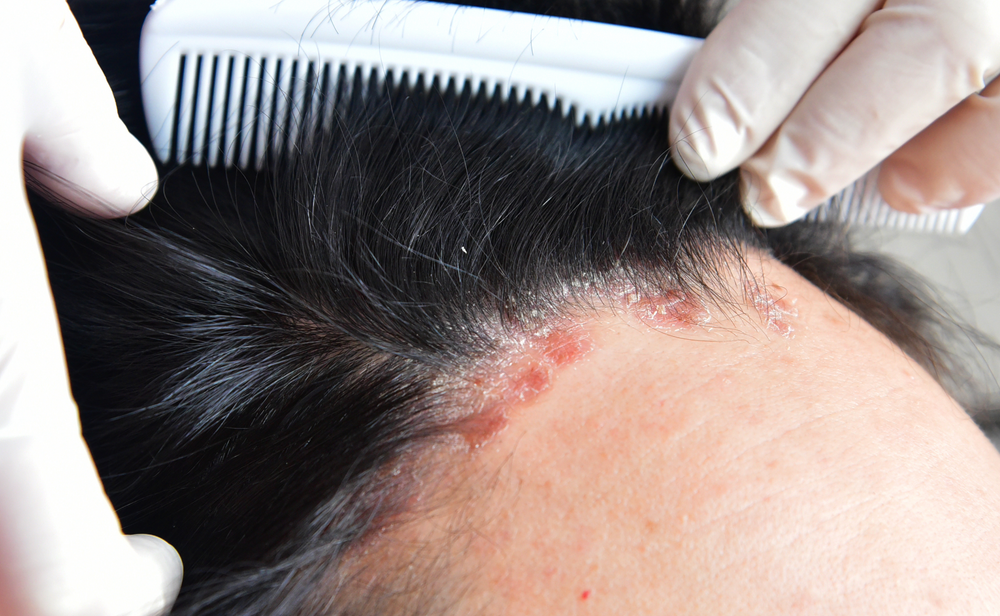Psoriasis is a chronic autoimmune skin condition characterized by inflammation – such as raised plaques or scales on the skin – caused by a dysfunction in the immune system. It can occur at any age and affects both men and women. According to current studies, more than 8 million people in the US have psoriasis.
Divi's scalp care products, such as our Scalp Serum, contain a range of clean ingredients to help those with this itchy, painful condition manage their symptoms better.
What is Psoriasis, and What Causes Psoriasis?
Psoriasis is the result of an accelerated skin cell production process. The typical life cycle of a skin cell is around one month, and this production process is greatly accelerated in people with psoriasis and may occur in just a few days.
The immune system becomes overactive and can't shed older skin cells faster than it can produce new ones, causing them to pile up and create red or purple, itchy, and scaly skin.
There are also different kinds of psoriasis, each affecting different body parts and with their own severity levels.
It is essential to know that psoriasis is non-contagious and isn't caused by bacteria, fungi, or another type of infection.
While research is still ongoing on the causes of psoriasis, there is a genetic link to it. Studies by the National Psoriasis Foundation show that around 10% of people inherit one or more of the genes that could lead to psoriasis, but only 2%-3% get the disease.
What Are the Different Types of Psoriasis?
There are different types of psoriasis, each with different signs and symptoms.

Plaque Psoriasis
Plaque psoriasis is the most common type of psoriasis. It causes raised, dry, itchy skin patches (plaques) covered with white scales, which can be many or few. Plaque psoriasis usually appears on the knees, elbows, scalp, and lower back.
Psoriatic Arthritis
Psoriatic arthritis is a condition where you have both psoriasis and arthritis (joint inflammation). In 70% of cases, people have psoriasis for about 10 years before getting psoriatic arthritis. About 90% of people with it also have nail changes.
Scalp Psoriasis
Scalp psoriasis can appear differently on different skin tones. On light to medium skin tones, it often appears as raised, reddish patches with white scales, and on darker skin tones, patches appear purple with gray scales.
It can be a single patch or several and can even affect your entire scalp. It can also spread to your forehead, behind the ears, and the back of the neck.
Erythrodermic Psoriasis
Erythrodermic psoriasis is the rarest type, but it's very serious. Erythrodermic psoriasis affects most of the body and causes widespread, scaly rashes with intense itching and burning. This type of psoriasis can be acute or chronic.
Inverse Psoriasis
Inverse psoriasis is an immune-mediated disease that fungal infections can trigger. This psoriasis causes smooth patches of inflamed skin that worsen with friction and sweating. It mainly affects the skin folds of the breasts, groin and buttocks.
Guttate Psoriasis
Guttate psoriasis primarily affects children and young adults and can be triggered by a bacterial infection such as strep throat. Guttate psoriasis is marked by small, pink-red spots often appearing on the torso, upper arms, legs and scalp.
Nail Psoriasis
Nail psoriasis affects the fingernails and toenails, causing pitting (tiny dents), discoloration (yellow-brown), abnormal nail growth, and painful, tender nails. Nail psoriasis is even more common in people who have psoriatic arthritis. Nail psoriasis might loosen or separate the nail from the nail bed.
Pustular Psoriasis
Pustular psoriasis is a rare type of psoriasis that mostly appears in adults. Pustular psoriasis causes clearly defined pus-filled blisters (pustules) surrounded by red skin. While these may look like infections, they're not. It can occur in small areas or widespread patches of the body, such as the hands (palms) or feet (soles).
What Are the Main Causes of Psoriasis?
The cause of psoriasis isn’t yet fully understood. Researchers believe that both genetic and environmental factors play a role.
Moreover, the genetics of psoriasis are complex, and it is possible to develop psoriasis even if you have no family history of the disease. Many people predisposed to psoriasis can be asymptomatic for years until environmental factors trigger the disease.
Triggers can vary from person to person, but the common triggers for psoriasis include the following:
- Infections/illnesses – Such as skin infections or strep throat
- Stress – Common psoriasis triggers, and at the same time, a psoriasis flare can cause stress, creating a vicious circle
- Skin injuries – Such as a cut or scrap, sunburn, bruise, insect bites, and vaccination
- Certain medications – Including high blood pressure drugs, antimalarial drugs, and lithium
- Rapid withdrawal of injected or oral corticosteroids
- Weather – Especially cold, dry conditions
- Smoking – Including exposure to secondhand smoke
- Heavy alcohol consumption
While our products can't tackle the underlying causes of psoriasis – as much as we'd like to be able to control the weather! – Divi's dermatologist-approved products can help improve symptoms.
What Are the Common Signs and Symptoms of Psoriasis?
The signs and symptoms of psoriasis can vary depending on your type of psoriasis. The five most common symptoms of psoriasis include:
- Rashes or patches of red, inflamed skin, often covered with loose, white scales – the plaques can merge and cover large areas in severe cases
- Itchy, painful skin that can crack or bleed
- Small areas of bleeding where the affected skin is scratched
- Discoloration, thickening or pitting of fingernails and toenails (nails may also begin to crumble or detach from the nail bed)
- Scaly plaques (patches) on the scalp
Does Scalp Psoriasis Cause Hair Loss?
Scalp psoriasis can cause hair loss, but only temporarily.
Scalp psoriasis can extend beyond the scalp and appear on the forehead, back of the neck, or behind the ears. The scalp becomes dry and itchy, and there is the formation of silvery-white scales and dandruff-like flaking. Scratching your scalp or forcefully picking the scaly skin may result in hair loss.
To prevent scalp itching and possible resulting hair loss, try the following tips:
- Try hair products that contain menthol, like Divi's Shampoo, Conditioner, and Scalp Serum
- Limit the use of hot tools to style your hair, such as blow dryers
- Use a conditioner to keep your scalp moisturized
- Press a wet towel or ice pack against the irritated area of the scalp
Once the symptoms are under control, hair usually grows back. According to the National Psoriasis Foundation, finding the proper scalp psoriasis treatment can be tricky as everyone responds differently.
How Can Psoriasis Be Treated?
While there is no cure for psoriasis, various treatment options can prevent your skin cells from growing too quickly, reducing inflammation and the formation of scales. Options include topical therapy (creams and ointments), phototherapy (light therapy), and oral or injectable medications.
The treatment plan will depend on your age and overall health, the severity of psoriasis, and your response to previous treatments and self-care measures. You may need to try different drugs or a combination of treatments before finding an effective approach.
Treat Scalp Psoriasis with Divi's Scalp Serum
Divi's Scalp Serum contains tea tree oil, green tea extract, rosemary leaf extract and peppermint oil, among many other dermatologist-approved ingredients. These clean ingredients can be effective at treating scalp psoriasis.
Let's find out how! Here are a few of the ingredients to help with scalp psoriasis:
- Tea tree oil has anti-inflammatory effects as well as antibacterial, antifungal and antiviral properties. Safe to say, it's somewhat of a superhero ingredient. Tea tree oil's anti-inflammatory properties can benefit those with scalp psoriasis by reducing irritated, inflamed skin.
- Green tea extract's benefits for those with psoriasis are pretty technical. Essentially, it can suppress inflammation and helps regulate the expression of Caspase-14, a protein that regulates the life cycle of a skin cell. Since psoriasis is caused by skin cells regenerating too quickly, this can be advantageous in managing the condition.
- Rosemary leaf extract has natural antiseptic properties. It's a superior disinfectant for our skin, including the scalp.
- Peppermint oil may help reduce the itching and pain you get in and around psoriasis patches.
Topical Therapy
Topical psoriasis treatments, such as creams and ointments, can help treat mild to moderate psoriasis. Particularly, emollients are valuable and inexpensive adjuncts to psoriasis treatment. Keeping psoriatic skin soft and moist minimizes psoriasis symptoms like itching and tenderness.
There are also topical corticosteroids with different potency levels used on different areas of the body and the severity of scaling.
Light Therapy
Light therapy uses natural or ultraviolet (UV) light to help reduce symptoms of mild to moderate psoriasis. Sunlight can slow down rapid cell growth by penetrating and killing the overactive white blood cells attacking healthy skin cells.
Psoriasis vs. Eczema: What's the Difference?
The symptoms of psoriasis and eczema can appear so similar that it can be hard to tell the difference between them. However, there are ways to tell them apart.
Psoriasis causes red patches (plaques) of red, raised skin that can have thick, silvery scales. Eczema causes dry and bumpy skin rash, which may be scaly, crusty or oozing.
Eczema also typically causes a more intense itch than psoriasis, which can lead to scratching the skin hard enough to bleed. Psoriasis can also be itchy, but your skin may sting or burn.
Eczema is usually triggered by things that irritate the skin, like soaps, disinfectants and detergents, as well as infections, sweating, stress, humidity, and hormonal changes. While psoriasis shares some of these triggers, like stress and infection, you can also get flare-ups when sunburn, scratches or vaccination injure your skin.
How is Psoriasis Diagnosed?
Two examinations may be necessary to diagnose psoriasis: a physical exam and a biopsy.
A health care provider or dermatologist (skin doctor) will examine your skin, nails and scalp for signs of psoriasis. They will ask if you have any symptoms of psoriasis like itchy, dry skin, family members with the condition, joint problems, or have undergone any recent changes in your life like increased stress or illness.
If your symptoms are unclear or your doctor wants to confirm their suspected diagnosis, they may remove a bit of your skin as a sample for a biopsy. Your skin sample will be examined under a microscope to determine whether you have psoriasis and the type you have.
Common Complications of Psoriasis
For some people with psoriasis, the skin condition can cause more than itchiness and scaling skin. Psoriasis can lead to arthritis and swollen joints.
If you have psoriasis, you might be at greater risk of developing other conditions, including:
- Swollen, stiff, and painful joints from psoriasis arthritis
- Heart disease
- Obesity
- Type 2 diabetes
- Post-inflammatory hypopigmentation or hyperpigmentation (temporary skin color changes)
- Mental health conditions, such as depression
- Other autoimmune diseases or certain cancers, such as Crohn's disease, metabolic syndrome, celiac disease and liver disease
When to See a Doctor for Psoriasis?
If you suspect you have psoriasis, see your healthcare provider to ensure a proper diagnosis and treatment plan.
Seek medical care if:
- Skin patches become severe or widespread
- Skin plaques won't stop bleeding or cause pain/discomfort
- New joint pain, or when stiff, achy joints get worse
- It doesn't improve with treatment
- Signs of infection like pain, swelling, redness, pus, skin is hot to the touch, and a fever
Let Divi Help
Divi's Scalp Serum can help relieve some of the symptoms associated with psoriasis. Calming tea tree and peppermint oils are among the clean ingredients found in all of Divi's scalp care products, including Divi's Shampoo and Conditioner. Free of synthetic fragrances and animal byproducts, these gentle scalp care products are suitable for both vegans and people with skin conditions.






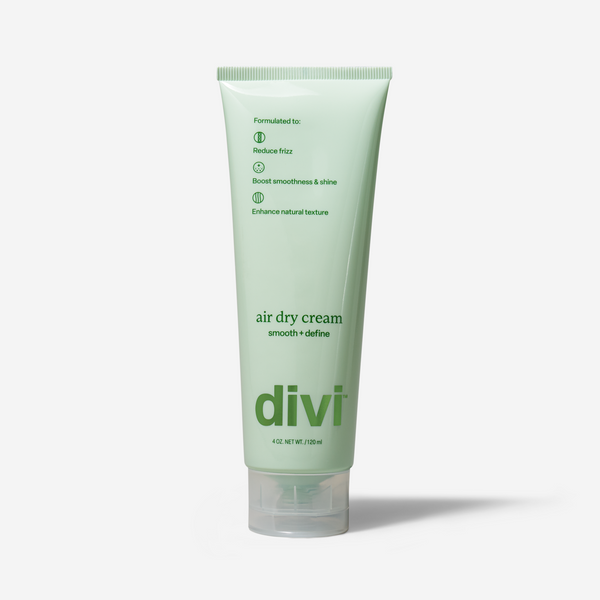
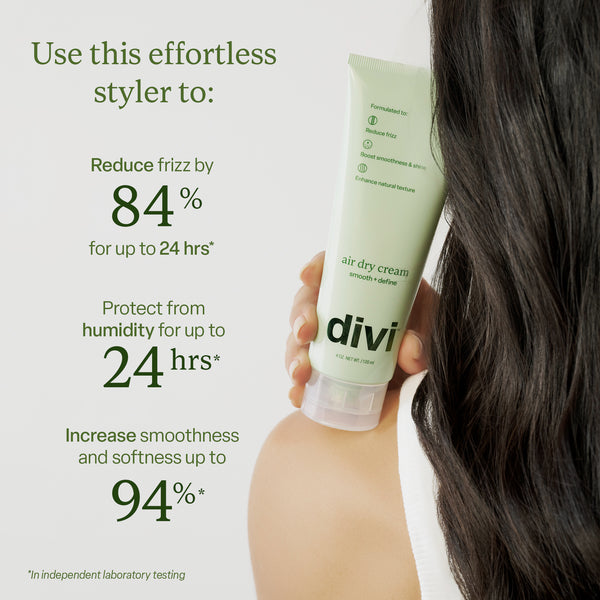

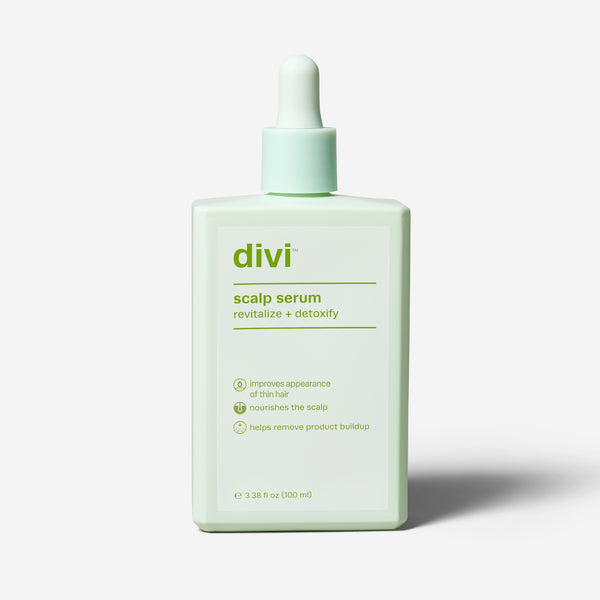

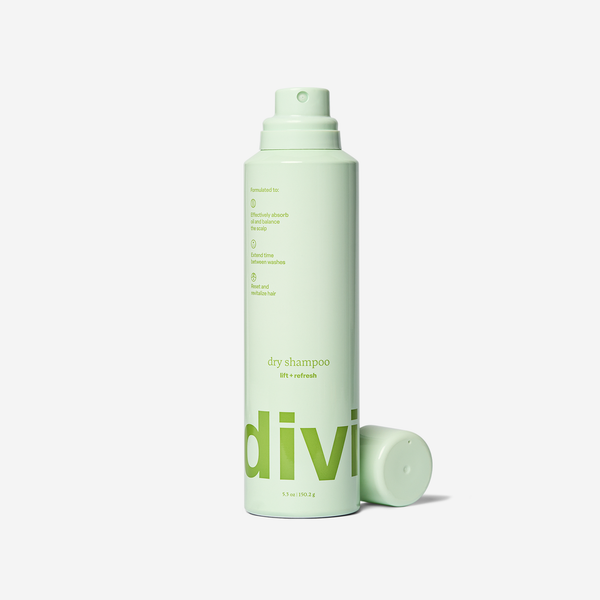

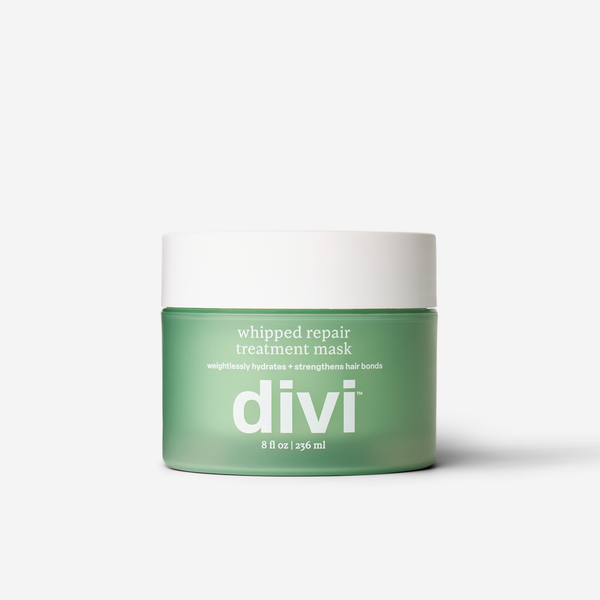
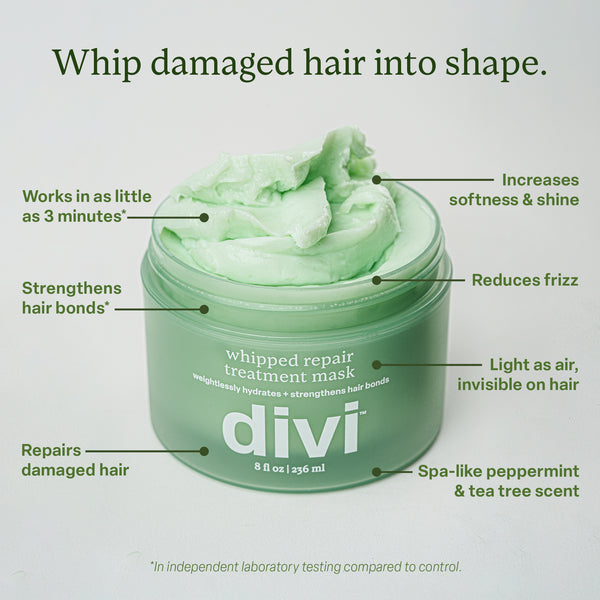
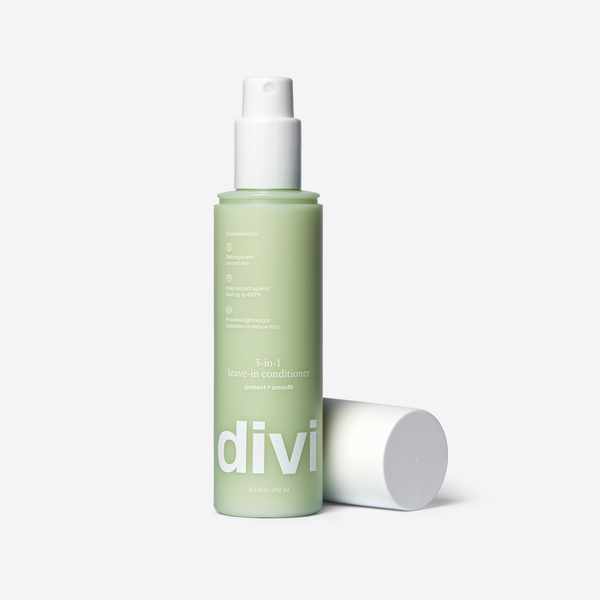

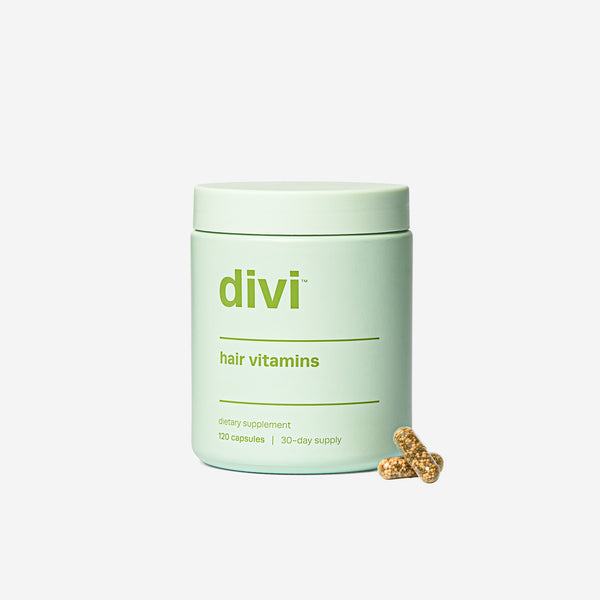
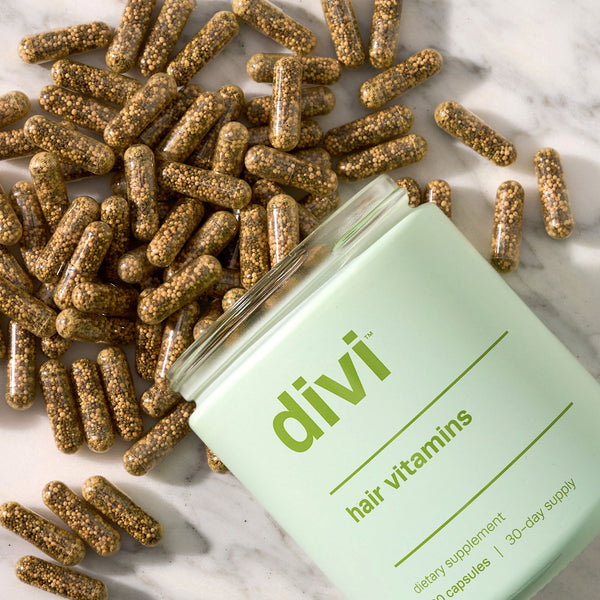
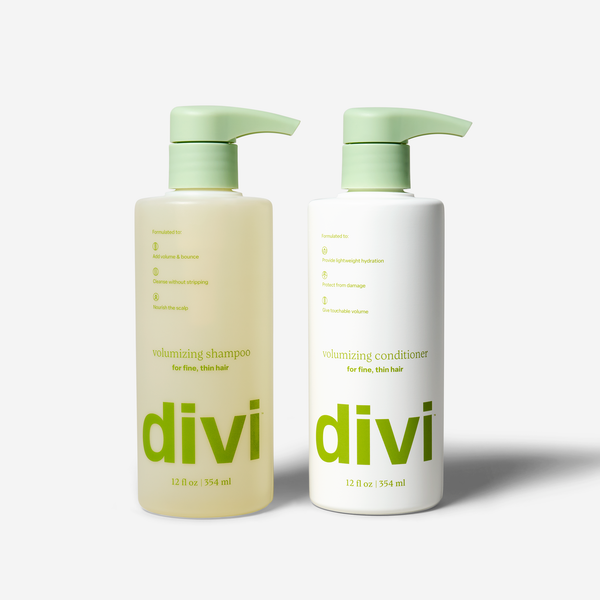





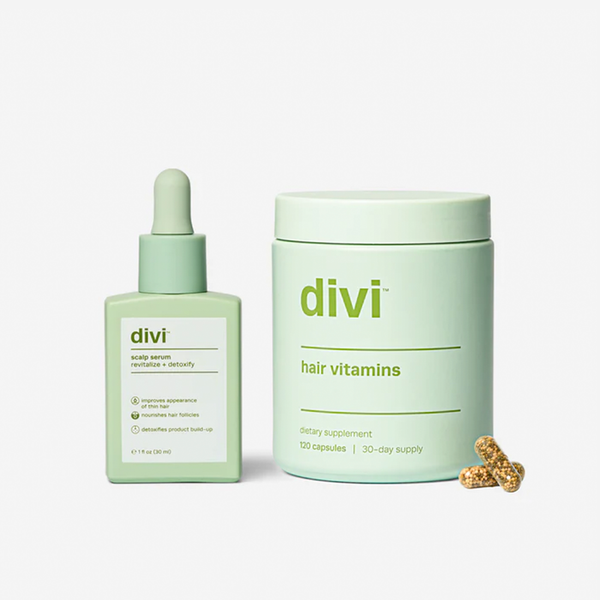
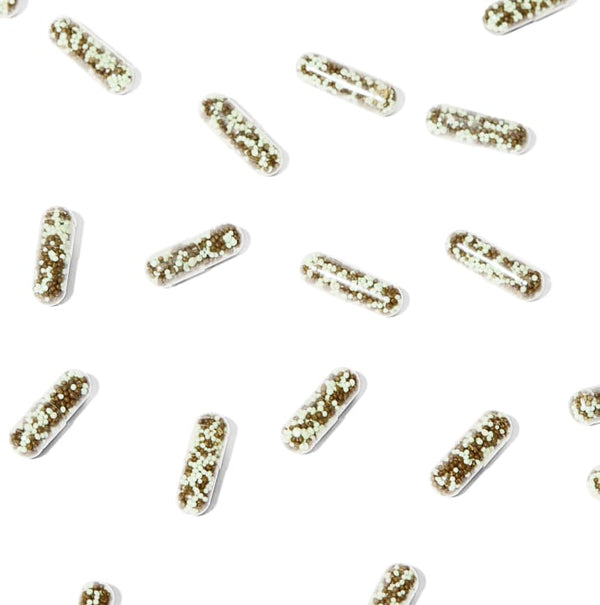
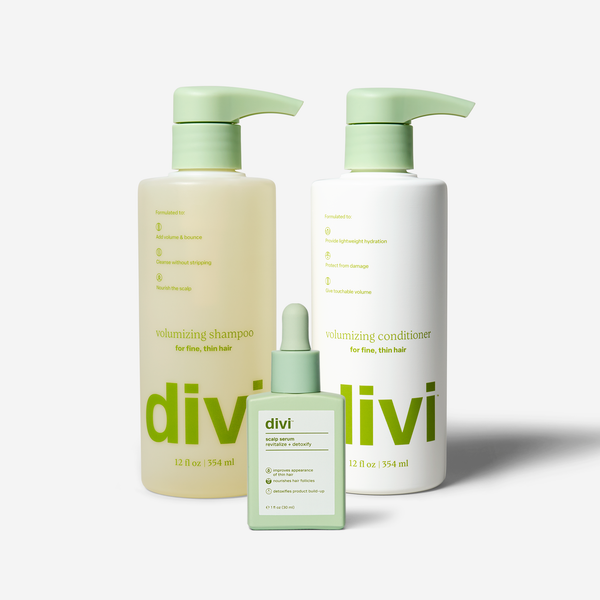












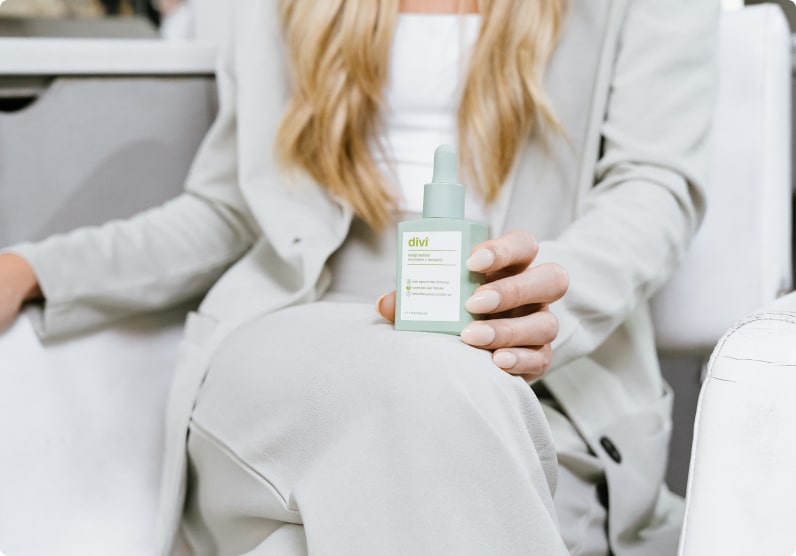






 30ml Scalp Serum
30ml Scalp Serum
 100ml Scalp Serum
100ml Scalp Serum
 Volumizing Shampoo
Volumizing Shampoo
 Hydrating Shampoo
Hydrating Shampoo
 Travel-Sized Volumizing Shampoo
Travel-Sized Volumizing Shampoo
 Travel-Sized Hydrating Shampoo
Travel-Sized Hydrating Shampoo
 Volumizing Conditioner
Volumizing Conditioner
 Hydrating Conditioner
Hydrating Conditioner
 Travel-Sized Volumizing Conditioner
Travel-Sized Volumizing Conditioner
 Travel-Sized Hydrating Conditioner
Travel-Sized Hydrating Conditioner
 3-in-1 Leave-In Conditioner
3-in-1 Leave-In Conditioner
 Best Sellers Bundle
Best Sellers Bundle
 Volumizing Starter Bundle
Volumizing Starter Bundle
 Hydrating Starter Bundle
Hydrating Starter Bundle
 The Healthy Hair Bundle
The Healthy Hair Bundle
 Hair Vitamins Trio
Hair Vitamins Trio
 Dry Shampoo
Dry Shampoo
 Hair Vitamins
Hair Vitamins
 Volumizing Shampoo & Conditioner
Volumizing Shampoo & Conditioner
 Travel-Sized Volume Duo
Travel-Sized Volume Duo
 Hydrating Shampoo & Conditioner
Hydrating Shampoo & Conditioner
 Travel-Sized Hydrating Duo
Travel-Sized Hydrating Duo
 Travel-Sized Dry Shampoo
Travel-Sized Dry Shampoo
 Travel-Sized Dry Shampoo Trio
Travel-Sized Dry Shampoo Trio
